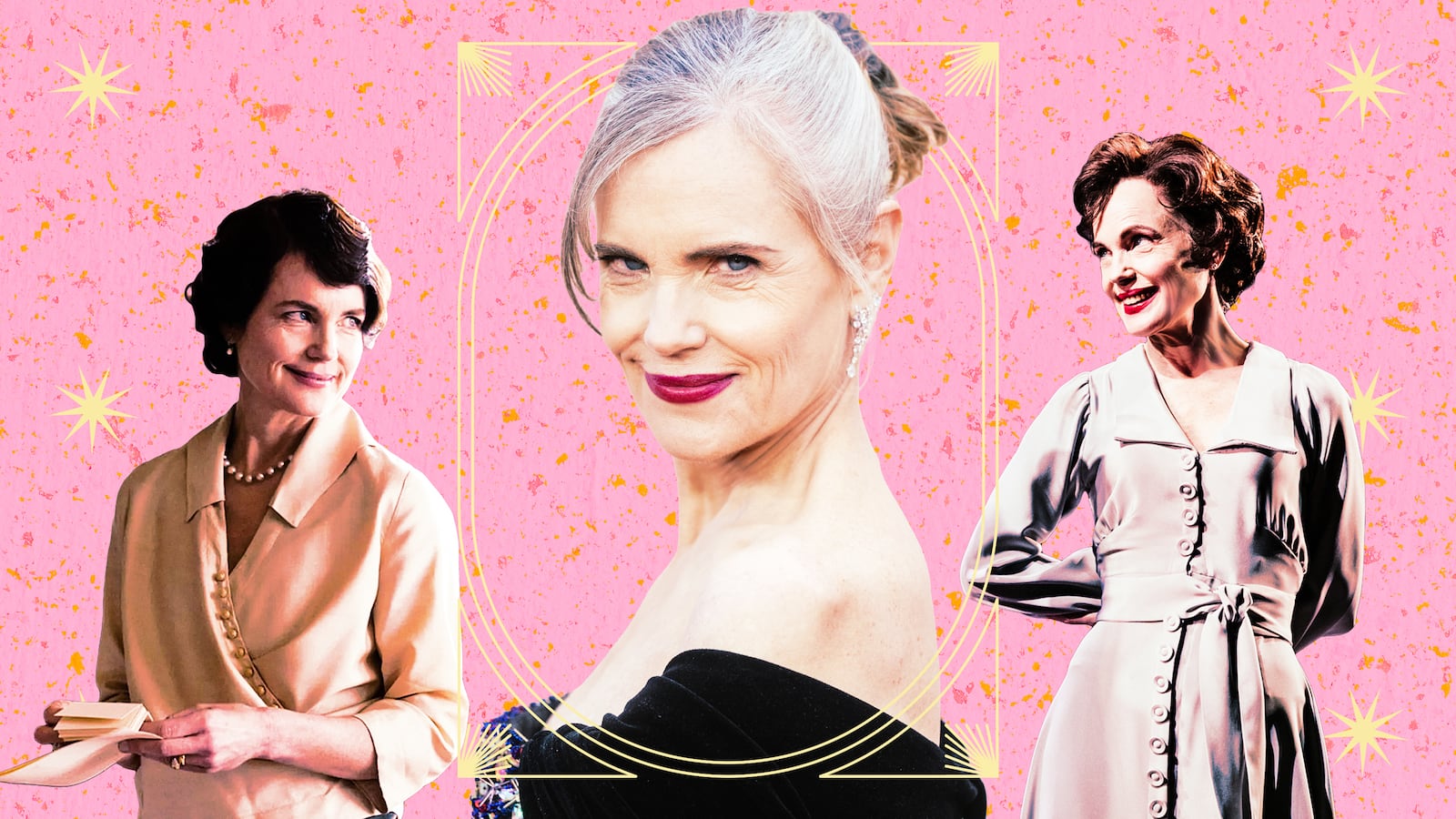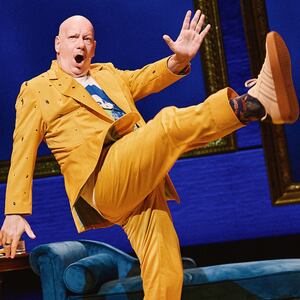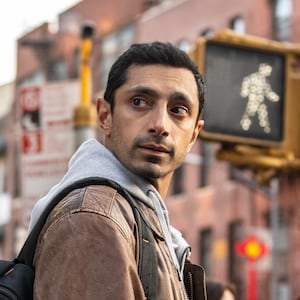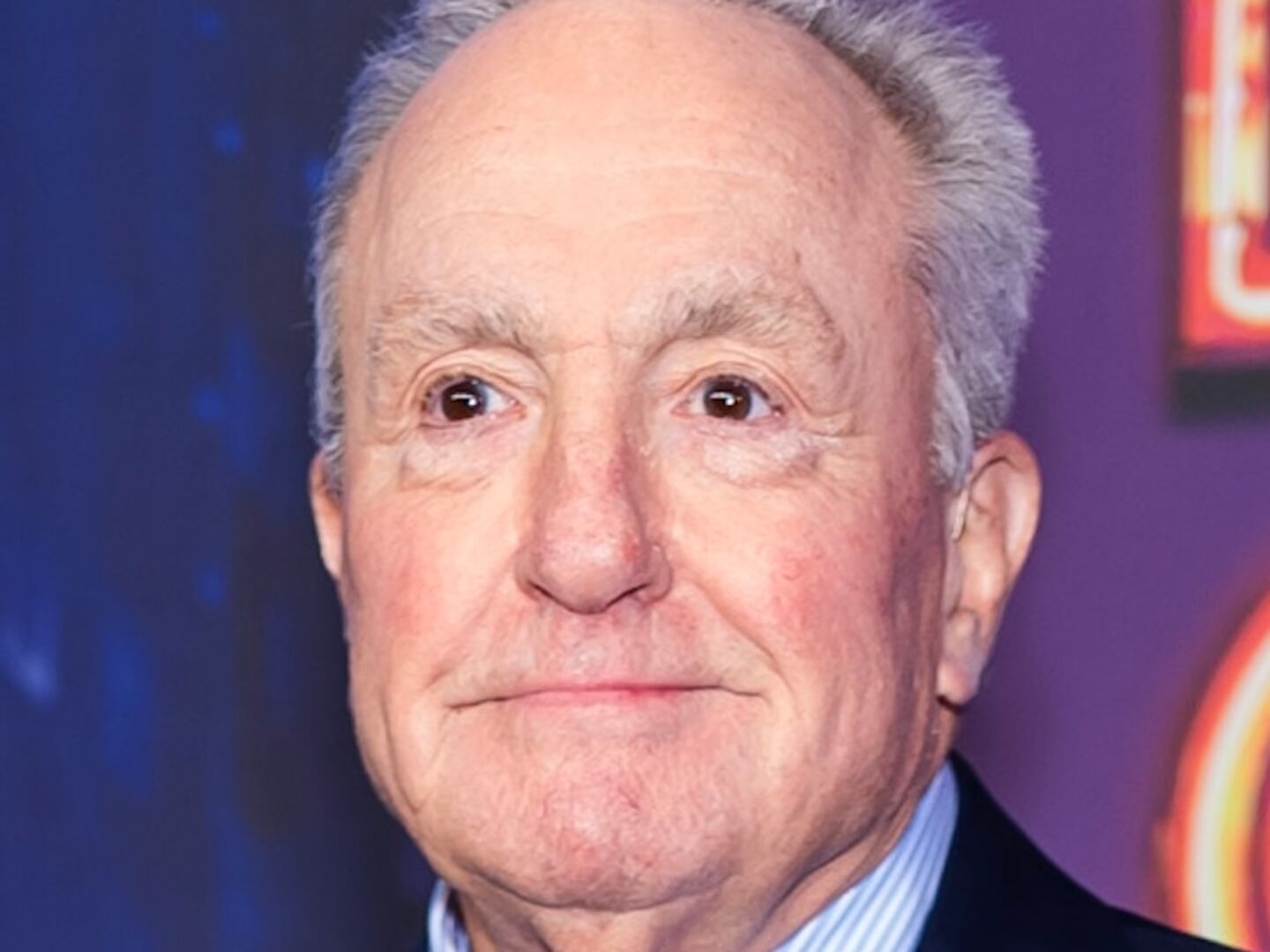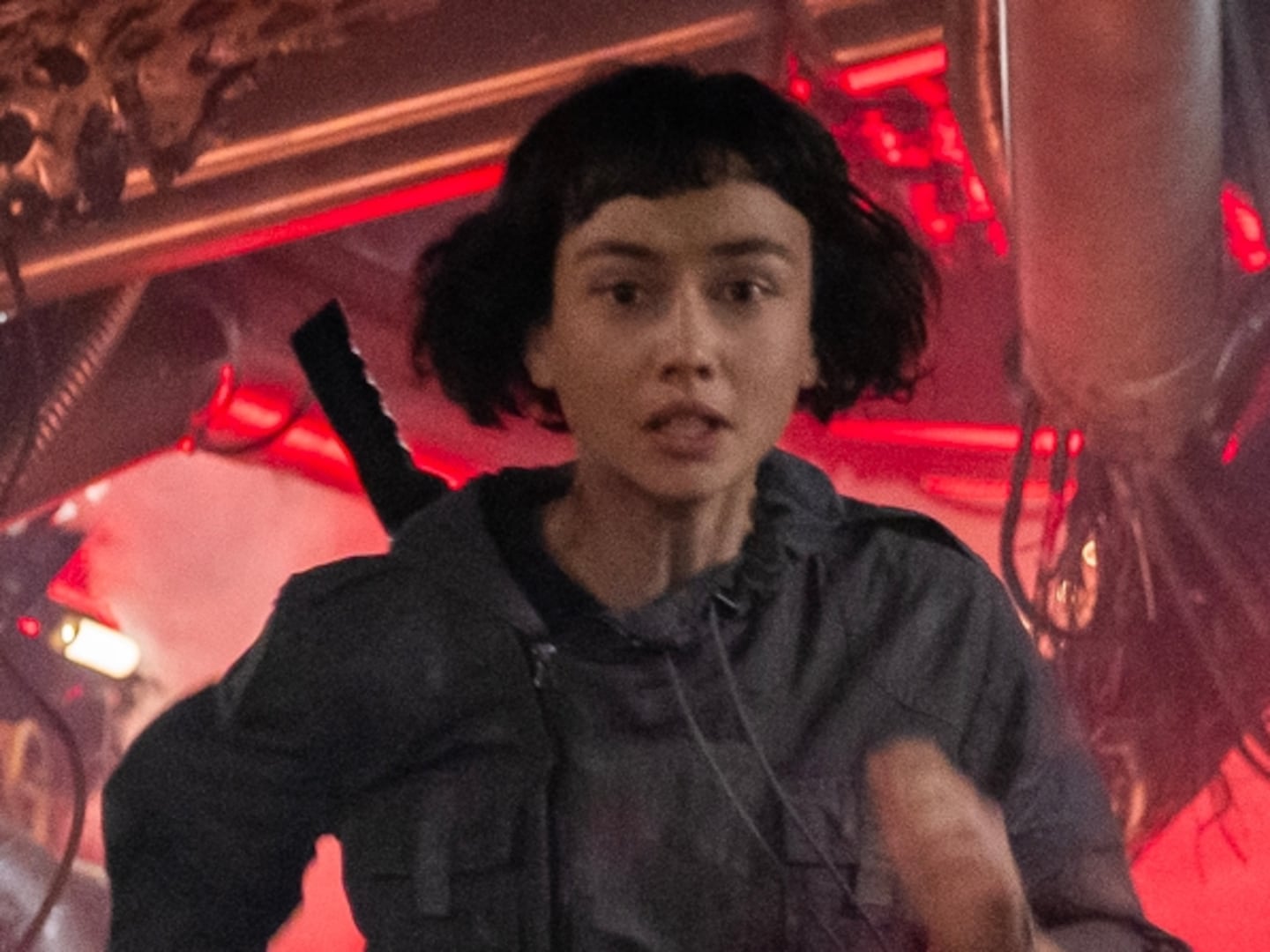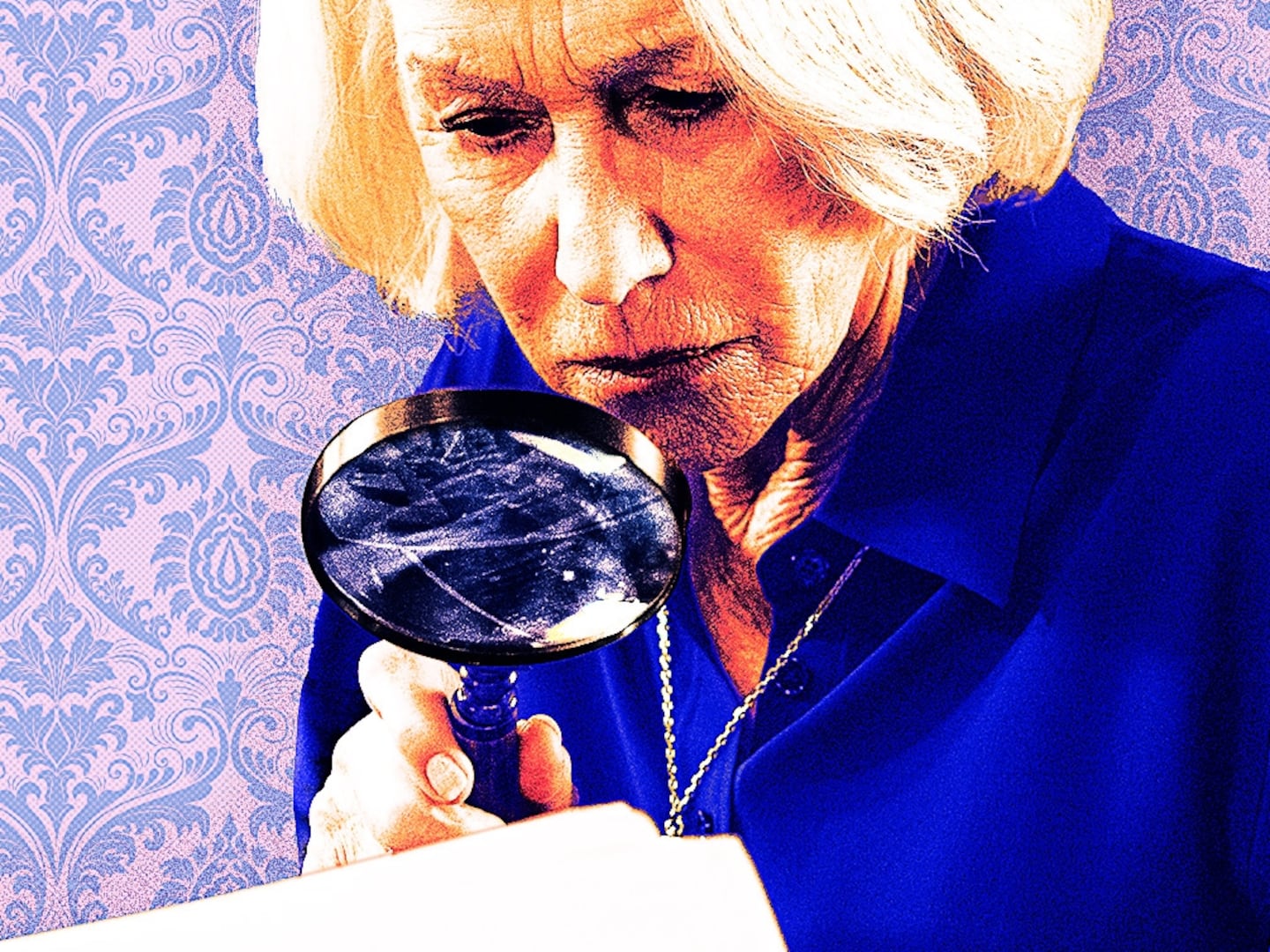Who knew Cora Crawley, Duchess of Grantham, had such a potty mouth? Well, kind of. Right now, starring as Hollywood icon Ava Gardner in Ava: The Secret Conversations (New York City Center, to Sept. 14), the f-word tumbles repeatedly from Downton Abbey star Elizabeth McGovern’s mouth.
Written by McGovern, the play is based on the book The Secret Conversations by Gardner and her biographer Peter Evans. In the play, we see Gardner and Evans (Aaron Costa Ganis) in a cat-and-mouse game of revelation and reticence, as in her plush London apartment he tries to get her to divulge the spiciest details of her private life, principally around her relationships and marriages to Mickey Rooney, Artie Shaw, and Frank Sinatra (also played by Ganis). We watch Gardner open up to Evans, and then close down, as she feels her privacy increasingly intruded upon.
Just before the play’s run ends in New York, Downton fever will erupt again. Scheduled for release on Sept. 12, Downton Abbey: The Grand Finale—sequel to 2022’s Downton Abbey: A New Era—is the third and (allegedly) final movie in Julian Fellowes’ hit period drama franchise.
“I have to say it was very difficult to get the whole cast to throw themselves into this last film,” McGovern, 64, said. “We had a lot of fear about it, around Maggie not being here, and ‘How can we do another one?’” (Dame Maggie Smith, who played acid-tongued fan favorite Violet Crawley, died last September, aged 89.)
“I was really dreading doing the film thinking we’d be just missing her every second,” McGovern said of Smith’s absence. “But I felt like she was there I really did. She’s just so in the fabric of it all. It’s nice to think when people die the legacy of their personality does carry on—and I could feel it.”
“I don’t think I am alone in thinking that this is the best of the films,” McGovern said. “I can’t explain why, but it just clicked. It just lifts you up and takes you into another world—it’s something about the fact of this particular chemistry of characters being together for so long in the dynamic they enjoy. It has such emotional gravitas—you can’t fake it. I absolutely loved it.”
A man walks behind McGovern. “The director (Simon Curtis) just walked in! My husband. He really was the right guy to do it because he’d lived with it through me for so many years.”

But is this really the final-ever Downton? “Yes, I’m here to say that I think this is the final one, I really do—at least in this incarnation with these people,” McGovern said, before adding tantalizingly, “Maybe at some point it will jump back in time, like a prequel, with a young cast. I don’t know.”
At the beginning of the series, McGovern hoped to have input into Cora’s storylines, “but that clearly was not the culture of how that show was run. I soon just decided not to go there. It was not going to be worth the frustration.”
In the final Downton movie, McGovern says she is happy with where Cora’s storyline ends up. “Paul Giamatti comes back as my brother, which gives more of a sense of where Cora comes from. It firms up her identity a little bit in this last one. She and Robert (Cora’s husband played by Hugh Bonneville) are as usual trying to adjust to a new world.
“Rather than trying to create a fresh story, the drama comes naturally from all the characters—every character goes a bit deeper into their private lives. The film is really focused on the tapestry of interactions between them, which I think is the right way to do it rather than an ambitious, big ending. I love it.”
She hoped the series would explore the struggles Cora went through as a rich American woman marrying into British high society. The wealth of such women saved the aristocratic families like the Crawleys, and their crumbling stately homes, she says, yet they were still initially looked down upon by snooty high society. How would those women fight to assert themselves?

How strange, I say—that’s exactly the storyline Fellowes has sketched for Gladys Russell (Taissa Farmiga) in season three of The Gilded Age, who (in my head at least) is a younger version of “Cora,” a number of years before we first meet Cora in Downton as the established Downton chatelaine.
“I feel terrible, I haven’t had a moment to watch The Gilded Age, but I think I should,” said McGovern. “I hear it hit its stride this season.”
“Hollywood is very much a man’s world”
Playing Gardner is “very liberating and quite fun,” said McGovern. “She is so uncensored, and has a tendency to say whatever is on her mind, that I feel I can just leave all the inhibitions I carry around with me at the door. The whole experience is also a way for me to channel, and get off my chest, a bit of my life experience through playing Ava. I can obviously relate to her ambivalence about the business, the requirements of Hollywood, and her frustrations around it. My career was so different to Ava’s, it was a completely different era, but as a young girl I did find myself kicking against the machine that is Hollywood.”
In the play, which has already had productions in London and Los Angeles, the push-pull game between Gardner and Evans is played out alongside the relationships she had with men as echoing stories of intimacy and estrangement. Evans additionally imagines episodes of Gardner’s life of glamor and drama.
Preparing to write the play, McGovern didn’t know anything about Gardner, apart from her name and stardom, until she read Evans’ book. “Pretty much everything I discovered was revelatory,” McGovern said. “The surprise to me was that the more I found out about her the more I felt I could relate to her. Everything I read about her reinforced the sense of her having a natural instinct to understand and empathize with other people. She had a generosity and warmth about her, even when she was pissed off, and a kind of innate intelligence that never let her down.”
Gardner was “very aware of playing the part,” McGovern said, whether that be “the woman men dream about” when she was young, or the aging Hollywood diva Evans encountered.

Hollywood remains fundamentally sexist, McGovern said. “I don’t think Hollywood’s changed very much, but what has changed is the dialogue people have about women and their place in Hollywood. Things are being said now that there was literally no language for 20 years ago. That is incredibly liberating and represents real progress, but I don’t think that has manifested any kind of change really. I think it’s very much a man’s world, and the stories are projections of the male agenda for sure. At least we’re talking about it more.”
Looking back on her own experiences as a young person in Hollywood, McGovern has realized “what was absolutely the norm for me is unacceptable now, so that’s progress. I was one of the most lucky ones. I came from such a strong family background, I never was in the position where I felt any desperation about my career. I kind of accepted the game of playing into what a male projection required you to be. But I have two daughters now and I don’t think they would put up with any of it—or have any interest to.”
Are there more and better parts for older female actors now? “I don’t actually see many older women playing roles,” McGovern said. “There are some exceptions of course and always have been. I don’t think that’s changed.”
McGovern’s career has spanned big and small screens and stage; she made her debut in Ordinary People (1980). Her role in her second movie, Ragtime, won her an Oscar nomination. She has also won, alongside her fellow Downton cast, a Screen Actors Guild Award for Outstanding Performance by an Ensemble in a Drama Series, and scored three Golden Globe nominations.
The success of Downton surprised McGovern at first. “I did know I loved it. But I assumed it would just be watched by my mother on her little black and white TV in Encino, California. I never thought it would ever have the kind of audience it’s got. I still honestly can’t believe it.”
McGovern’s favorite Cora moment to play was the “seasons of grief” she and Robert went through after daughter Sybil’s death. I tell her mine was that early bonkers moment when her evil maid O’Brien put a bar of soap under her feet, meaning Cora miscarried.
“I feel like the show really lost something when it lost O’Brien,” said McGovern. “I loved the actor who played her (Siobhan Finneran). She was such a great character, and she and Cora were juxtaposed in this very particular way in enjoying this unbelievable intimacy yet having no intimacy at all. O’Brien knew everything about Cora, but Cora knew absolutely nothing about O’Brien.”

After New York, McGovern and the play travel for performances in Chicago and Toronto. She has written a film she would like to make next year, while on stage she would love to re-mount the 2023 production of Edward Albee’s Who’s Afraid of Virginia Woolf? she starred in—to critical acclaim—at the Theatre Royal Bath in the U.K. Her band, Sadie and the Hotheads, have just released a new album, Let’s Stop Fighting, and are “chugging along.”
As she travels the country playing Gardner, McGovern hopes audiences “fall in love with the imagery and romance of the old movies created by the Hollywood system while at the same time walking away with a visceral sense at the damage perpetrated particularly on the women that were in it.”
For McGovern, both Ava and Cora are two women from history (one real, one imagined), who thought that in their different eras the way for a woman to have power was through men, “or by extension, their sexual value. In some ways they probably did have quite a bit of power.” In this final Downton movie, “the women are in control and getting their way a lot of the time,” she added. “Ava would be the first to say that she lived her life exactly as she wanted to. It was always her calling the shots. It’s one of the things I really liked about her.”

